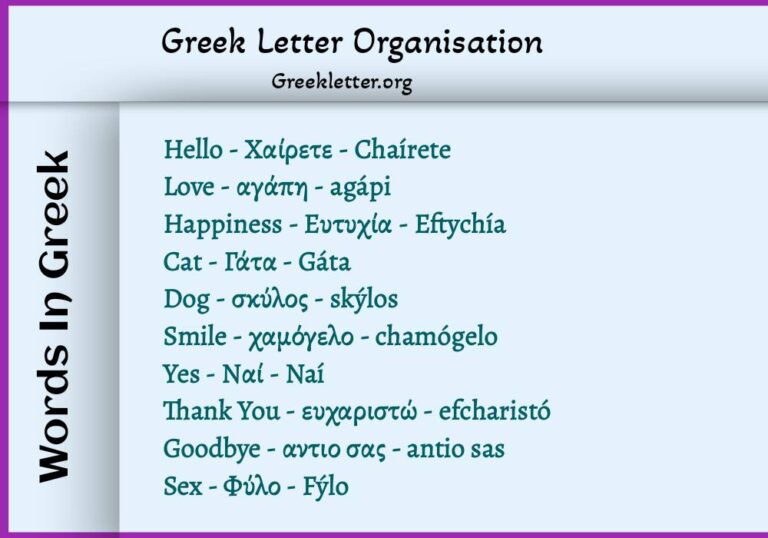How Do You Say Bye In Greek
Have you ever wondered how to say bye in Greek? Whether you’re planning a trip to Greece or simply interested in learning new languages, knowing a few basic phrases can go a long way.
Saying goodbye is essential to any conversation and can leave a lasting impression on the people you meet.
In this article, we will explore different ways to say bye in Greek, including pronunciation tips and audio examples to help you master these greetings with ease. So, let’s dive into Greek language and culture and add some useful phrases to your repertoire!
How Do You Say Bye In Greek
To say “bye” in Greek, you can use several phrases, each with its level of formality. Here’s a detailed explanation:
Αντίο (Andío):
- Pronunciation: ahn-DEE-oh
- Usage: This is a standard and versatile way to say “goodbye” in Greek. It’s appropriate for most situations, both formal and informal.
Εις το επανιδείν (Eis to epanidín):
- Pronunciation: ees to eh-pah-nee-THEEN
- Usage: This phrase means “until we meet again.” It is a polite and warm way to say goodbye, often used among friends and in more formal settings.
Γειά σας (Geia sas):
- Pronunciation: yeh-AH sahs
- Usage: “Γειά σας” is a polite way to say “goodbye” when addressing a group of people or in a formal context.
Γειά σου (Geiá sou):
- Pronunciation: yeh-AH soo
- Usage: This is an informal and friendly way to say “goodbye” to someone you know well. It’s suitable for casual situations.
Καληνύχτα (Kaliníkhta):
- Pronunciation: kah-lee-NEEKH-tah
- Usage: “Καληνύχτα” means “goodnight,” and it’s typically used when parting ways in the evening or before bedtime.
Καλό απόγευμα (Kaló apógevma):
- Pronunciation: kah-LOH ah-POH-yev-mah
- Usage: This phrase means “good afternoon” and can be used when saying goodbye in the late afternoon.
Καλή επιτυχία (Kalí epitychía):
- Pronunciation: kah-LEE eh-pee-TEE-kee-ah
- Usage: “Καλή επιτυχία” means “good luck,” and it’s a way to wish someone well when parting ways.
Πάντα καλά (Pánta kalá):
- Pronunciation: PAHN-tah kah-LAH
- Usage: This phrase means “always well” or “take care.” It’s a warm way to say goodbye and show concern for the other person’s well-being.
The choice of phrase to use depends on the context, your relationship with the person you are addressing, and the formality you want to convey.
How To Say Bye In Greek
In Greek, there are several ways to say “bye,” each with its formality and nuances. Here’s a comparison with English:
- Αντίο (Andío) – Equivalent to “Goodbye” in English. It’s a standard and versatile way to say farewell.
- Εις το επανιδείν (Eis to epanidín) – Similar to saying “Until we meet again” in English. It carries a sense of anticipation for future meetings.
- Γειά σας (Geia sas) – Comparable to saying “Goodbye” politely or formally, similar to “Goodbye” in English.
- Γειά σου (Geiá sou) – This is an informal and friendly way to say “bye,” equivalent to “Bye” or “See you later” in English.
- Καληνύχτα (Kaliníkhta) – Equivalent to saying “Goodnight” in English, often used when parting in the evening or before bedtime.
- Καλό απόγευμα (Kaló apógevma) – Similar to saying “Good afternoon” when parting in the late afternoon, although it’s not a direct translation of “bye.”
- Καλή επιτυχία (Kalí epitychía) – Comparable to saying “Good luck” in English, conveying well wishes as you part ways.
- Πάντα καλά (Pánta kalá) – Equivalent to saying “Take care” or “All the best” in English, expressing concern for the other person’s well-being.
The choice of which Greek phrase to use depends on the context and your familiarity with the person you are addressing, similar to how you might choose different ways to say “bye” in English based on the situation and your relationship with the other person.
How To Say Bye In Greek Pronunciation
In Greek, to say “bye” or “goodbye,” you can use the phrase “Αντίο” (Andío). To pronounce it, break it down as follows: “Ahn” (rhyming with “barn”) for the first part, and “DEE-oh” (rhyming with “meow”) for the second part.
The accent in Greek often falls on the second-to-last syllable, so the stress is on “DEE-oh.” When you put it together, it sounds like “ahn-DEE-oh.” This is a commonly used and versatile way to bid farewell in Greek, suitable for most formal or informal situations.
Alternatively, if you want to express a more informal and friendly goodbye, you can use “Γειά σου” (Geiá sou). To pronounce it, say “yeh-AH” (rhyming with “yeah”) for the first part and “soo” (rhyming with “blue”) for the second part. It sounds like “yeh-AH soo.”
This is a casual and warm way to say goodbye to someone you know well, similar to saying “bye” or “see you later” in English.
How To Say Bye In Greek Audio
Today, we will dive into the fascinating world of Greek farewells. Learning how to say goodbye in different languages allows us to connect with people from around the globe and is also a fun way to broaden our cultural horizons.
Αντίο Audio
In this blog post, we will explore various ways of saying goodbye in Greek and provide an audio clip to listen to and practice.
In Greek, there are several ways to bid farewell, each carrying its unique meaning and level of formality. The most common way is Yasou, pronounced as ya-soo, which is used formally and casually.
It is similar to the English goodbye or see you later. If you want something more formal, you can say Antío sas, pronounced as an-dee-o sas, which conveys a sense of respect and politeness.
To truly immerse yourself in the Greek language and culture, it’s essential to know how these words sound and understand their context. By clicking on the play button below, you can listen to a native speaker pronouncing these farewell expressions accurately. So go ahead, embrace your inner linguist, and let’s learn how to say bye like a true Greek!
Learn Greek Greeting Words and Phrases Easily
Learning Greek greeting words and phrases can be a fun and rewarding experience. Here’s a step-by-step guide on how to learn Greek greeting words and phrases easily:
Start with Basic Phrases: Begin with common greetings like “Γειά σου” (Geiá sou) for informal situations and “Γειά σας” (Geiá sas) for formal settings.
Learn essential farewells such as “Αντίο” (Andío) for a standard goodbye and “Εις το επανιδείν” (Eis to epanidín) for a warm farewell.
Practice Pronunciation: Pay attention to pronunciation. Greek pronunciation may differ from English, so practice correctly saying the words. Utilize resources like online pronunciation guides or language learning apps.
Use Flashcards: Create flashcards with Greek greetings on one side and their English meanings on the other. Review these regularly to reinforce your memory.
Repeat and Practice Aloud: Repetition is key to language learning. Practice saying Greek greetings aloud multiple times. This helps with memorization and pronunciation.
Learn Time-of-Day Greetings: Familiarize yourself with time-specific greetings like “Καλημέρα” (Kaliméra) for “Good morning” and “Καλησπέρα” (Kalispéra) for “Good evening.” Practice using them at appropriate times.
Expand Your Vocabulary: Explore additional phrases, such as “Καληνύχτα” (Kaliníkhta) for “Good night” and “Καλή επιτυχία” (Kalí epitychía) for “Good luck.” These phrases can enhance your conversational skills.
Practice Conversations: Engage in simulated conversations or dialogues with a language partner or tutor. Practice using greetings in context to build your confidence.
Use Language Learning Apps and Resources: Utilize language learning apps like Duolingo, Memrise, or Rosetta Stone, which often offer Greek language courses.
Watch Greek Media: Watch Greek movies and TV shows, or listen to Greek music to expose yourself to natural conversations and greetings.
Immerse Yourself in Greek Culture: If possible, immerse yourself in Greek culture by visiting Greece or interacting with native speakers. Real-life experiences can deepen your understanding of greetings.
Take Online Courses or Classes: Enroll in online Greek language courses or join local classes if available. Structured learning environments can provide guidance and practice.
Practice Daily: Consistency is key. Spend a few minutes each day practicing Greek greetings to reinforce your knowledge.
Keep a Language Journal: Maintain a journal where you write down new greetings and phrases you learn. Use them in your daily journal entries to practice.
Seek Feedback: Request feedback from native speakers or language teachers to improve your pronunciation and usage.
Remember that learning a new language takes time and patience. Start with the basics, gradually build your vocabulary, and practice regularly. Over time, you’ll become more confident using Greek greetings in various situations.
Conclusion Points
In conclusion, learning to say bye in Greek can be a fun and useful addition to your language skills. Whether planning a trip to Greece or simply wanting to impress your Greek friends, knowing the proper way to say goodbye is important.
By following the pronunciation tips and listening to the audio examples provided, you can easily learn how to say bye in Greek.
Don’t stop there – continue exploring other greeting words and phrases in Greek to enhance your cultural knowledge and communication abilities. So why wait? Start practicing today and immerse yourself in the beauty of the Greek language!
FAQs
1. How do you say bye in Greek?
In Greek, bye is said as αντίο (adio).
2. What is the correct way to say bye in Greek?
The correct way to say bye in Greek is αντίο (adio).
3. How do you pronounce the word for bye in Greek?
The pronunciation of αντίο (adio) is ahn-DEE-oh.
4. Is an audio guide available for learning to say bye in Greek?
There are audio guides available online that can help you learn how to say bye in Greek correctly.
5. Where can I learn greeting words in the Greek language?
You can learn greeting words and phrases in the Greek language through online language courses or by using language learning apps.
6. What are some other common greetings in Greek besides saying bye?
Common greetings in Greek include saying καλημέρα (kaliméra) for good morning or καλησπέρα (kalispera) for good evening.
7. Can you recommend any resources for learning Greek greetings?
Many online resources, such as websites and apps, provide lessons and exercises specifically focused on teaching Greek greetings.
8. Are there any cultural considerations when using greeting words in Greece?
It’s always a good idea to respect the local culture when using greeting words in Greece, so make sure to use them appropriately and with a friendly tone.






